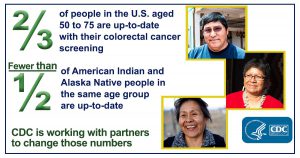A Matter of Trust: Colorectal Cancer Screening among Native Americans
Posted on by By Donald Haverkamp, MPH
By Donald Haverkamp, MPH
Colorectal cancer (cancer of the colon and rectum) is one of the most common cancers in the United States. Luckily, screening tests can find it early or even prevent it.
Unfortunately, only about two-thirds of people ages 50 to 75 in the United States are up-to-date with colorectal cancer screening. Among American Indians and Alaska Natives (AI/AN), the percentage is even lower: fewer than half are current with screening.
What Gets in the Way of Screening?
People avoid screening for a lot of reasons. Living far away from clinics—like many people on tribal lands—can make it harder to get screened on time. Driving to a clinic takes time, and it can take even longer and be more expensive to find a ride or take a bus, taxi, or even a plane, which people sometimes have to do in Alaska. And even if someone lives close to a clinic, he or she may not be able to take time off from work or find someone to watch children and older adults in the house. People who don’t visit a clinic regularly can miss out on possible times that they could get screened. Doctors and other people who work at these clinics can’t talk about screening with patients they never see.
What Is CDC Doing to Help?
CDC’s Division of Cancer Prevention and Control partners with Indian Health Service (IHS) and Tribally-run clinics using proven methods shown by science to work in other places to get more AI/AN men and women screened for colorectal cancer. Partnership helps us reach out in ways that respect customs and culture and create trust.
One method we use is to bring screening to AI/AN community members so we can get the message across even if they haven’t been to the clinic that testing is important. This is possible because there are screening tests (stool sample kits) that can be done at home.
We have had some success with mailing these tests to people in AI/AN communities before, along with information in English or a native language explaining what colorectal cancer is and why screening is important. The test kit also includes steps for using the test and sending it back to the clinic’s lab.
Working together with CDC, staff from tribal clinics have gotten training in talking about colorectal health and in patient navigation, which is a system where trained workers guide people through the whole process of screening. These people are called Tribal Community Health Representatives (CHRs), or AI/AN people who work in the clinics and know the tribal area and residents. Health care workers from outside the tribal area come in and train the CHRs to go into the community and talk about colorectal cancer and screening. Clinics use these CHRs to follow up with people who do not return the at-home stool sample kits, either with a phone call or a home visit, so people feel more comfortable talking about screening with someone familiar. So far, this has worked in some cases.
Where Do We Go from Here?
CDC is using many methods to help racial and ethnic groups like AI/AN people get screened as often as other people in the U.S. population. If CDC keeps working with IHS and Tribes across the country, it could lead to more AI/AN people getting screened for colorectal cancer at the right time, and could in the future mean fewer people in this group get or die from colorectal cancer.
Posted on by

